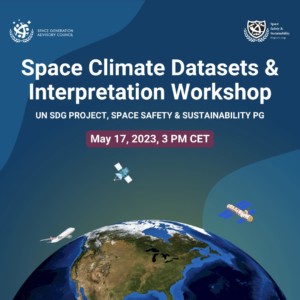

Space Climate Datasets and Interpretation for Everyone
May 17, 2023 @ 3:00 PM - 4:30 PM CEST
| FreeIncreasing access to space data can raise awareness about Earth’s situation. It helps to remove obstacles we have on our planet and change our perspective to see everything from a different angle.
Climate change is one of the major problems humans face these days and needs social knowledge and engagement to be tackled. But understanding and interpreting Earth Observation datasets is not easy for everyone and it requires expertise. This presents a challenge that not everyone will become aware of the disruptive activities on Earth affecting climate change.
The UN SDGs project of the Space Safety and Sustainability Project Group aims to give open access to space-based climate data to the public for increasing social engagement in climate change. This webinar will cover different topics that can help everyone become a local ambassador in their own community and raise awareness about climate data, data interpretation, policies and regulations, and data-sharing platforms.
By the end of this webinar, you will get knowledge about accessible climate datasets, how to use them and interpret raw data, methods and platforms for sharing data with the public, and policies for making space data available.

About Chukwuma Okolie:
Chukwuma Okolie is a Lecturer at the Department of Surveying and Geoinformatics, University of Lagos. His research interests are GIS and remote sensing applications, data fusion and modelling of urban and environmental changes. Chukwuma is a member of the SGAC Space Technology for Earth Applications (STEA) Project Group. Within STEA, he has served as a team lead in the REaltime Flood Risk Assessment in developing countries using Social media, Optical and SAR satellite data (REFRA-SOS), and an earth observation analyst in the AIOFAR project. Chukwuma is currently pursuing his PhD in Remote Sensing at the University of Cape Town. The focus of his PhD research is the enhancement of digital elevation models (DEMs) using explainable tree-based ensemble machine learning. In 2017, he was listed by xyHT as one of the 40 under 40 Geospatial Leaders worldwide, and recently, he was recognised as STEA PG Member of the Year 2022. Chukwuma is registered with the Surveyors Council of Nigeria (SURCON) and is a member of the Young Surveyors Network (YSN) in Nigeria and the International Society for Photogrammetry and Remote Sensing (ISPRS). He is active in several multidisciplinary research groups, is an active reviewer for scientific journals and is highly published.
About Jan-Peter Ceglarek:
Additionally, as a PhD candidate at the ESALab@TU Darmstadt, he develops the AI4CE system generation platform (a multi-purpose Digital Engineering playground) for future-proof system design both in big companies/agencies and the educational realm.
Besides that, he is a human who loves nature and is a fan of open-minded people with a positive error culture.
About Alexander Gruber:


